


The Curse Reversed
INTRODUCTION TO PURIM
Julius Streicher was the foremost anti-Semitic propagandist in the German Nazi
Party**
In 1945, Streicher was captured and brought before the
Nazi war criminal court at Nuremberg. For his part in
'Crimes Against
Humanity', he was sentenced to death. As he was led to the gallows,
he uttered his parting words, " PURIM 1946". He was referring
to the Book of Esther.
The Book of Esther records another anti-Semitic, Haman,
who also plotted to annihilate the
Jewish people who lived in the Persian Empire. Haman's
plot was turned around and he ended up ascending to the gallows for his
execution.
Those who curse the Jewish people are always, in the end cursed. Those who bless them are, in the end, blessed. That's what the Word of God's says. We can rejoice in God. For in God, we know that every dark cloud passes, and every night turns to dawn.
Those who curse the Jewish people are always, in the end cursed. Those who bless them are, in the end, blessed. That's what the Word of God's says. We can rejoice in God. For in God, we know that every dark cloud passes, and every night turns to dawn.
Feasts of Lots

Purim or the Feasts of Lots is a celebration of a defeat
of God's enemies and a deliverance of God's people. It is a one-day
carnival-like celebration in the Hebrew month Adar, which occurs in late
February or early March in the secular calendar.
Purim is traditionally celebrated by the Jewish People in the way that Mordecai instruction the Jews (Esther 9:19) to commemorate their deliverance by THE FOUR MAIN MITZVOT (commandments) OF PURIM:
1. eating a festive Purim
meal, the special holiday meal eaten on Purim afternoon
2. merrymaking
and wearing costumes celebrating how everything can turn upside-down and
into something else, and nothing is exactly what it seems to be
3. sending gifts of food
to at least one friend or relative, because Purim is a time of love and
friendship between Jews
4.
giving gifts to the poor
because Purim is a time of sharing and caring and helping
The events that led to the holiday of Purim can be found
in the Book of Esther or in Hebrew:
Megillot Esther
which is Hebrew
for the Scroll of Esther
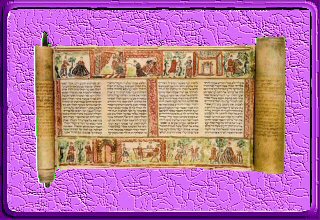
Blessings are customarily said before the reading of the
Scroll:
Baruch atah Adonai Eloheynu melech ha-olam
sheh-asah nissim l'avoteynu ba-yamim ha-heym
bazman hazeh.
Blessed are You, L-rd our G-d, King of the
universe,
who performed miracles for our forefathers in
those days at this time of year.
Baruch atah Adonai Eloheynu melech ha-olam
sheh-hechianu v'ki'manu v'higianu lazman hazeh.
Blessed are You, L-rd our G-d, King of the
universe,
who has given us life, lifted us up, and
brought us to this moment.
Then the Scroll of Esther is read
in the evening and the next day. During the reading of
the scroll the congregation blots out the sound of the name of Haman and his
memory using
noisemakers called groggers and by booing and stamping feet.
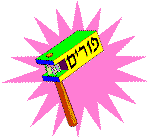
Groggers
are noise-makers used during
the Megillah reading to drown out the sound of Haman's name, symbolically
expressing the desire to rid the world of his evil.
The Story PURIM
(The Book of Esther)
Purim in a nutshell:
1) An ancient story of court intrigue
2) Deception
3) Miscommunication
4) Drunken parties
5) Assassinations plots
6) A foolish king
7) A delinquent queen
8) Villains
9) A strong hero
10) One beautiful heroine.
This is the stuff of which best-selling
novels are made!
The Book of Esther
began in the third year of the reign of Ahasuerus (also
know as Ahashverosh and Ahashuerus), the King of Persia. He decided to have a feast.
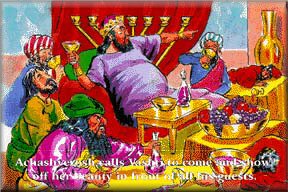
King Ahasuerus called Queen Vashti to come and show off
her beauty in front of all his guests. Queen Vashti refused to obey an order
from her husband, King Ahasuerus.

The king was furious and Queen Vashti
was banished!

Good bye, Vashti!
With Vashti gone, the foolish king
was advised to stage a
beauty contest to pick a new wife.

A beautiful Jewish orphan named Esther
was chosen as the
new queen. Esther, whose Hebrew name was Hadassah, was raised by her uncle
Mordecai, after her parents' death. Mordecai instructed Esther not to divulge
her Jewishness when she went to meet the King.
Soon after Esther became queen,
her uncle Mordecai overheard an assassination plot against the king while he
was sitting near the palace gate.
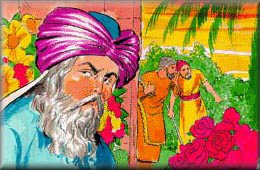
He reported the conversation to Esther who reported it to
the king, crediting Mordecai with the information. The incident was recorded in
the king's chronicles. Even though Mordecai saved the king's life, his efforts
went unrewarded and were quickly forgotten.
Meanwhile, a power-hungry, anti-Semitic named Haman
(boo ), a descendant of Amelak, the traditional enemy of the Jews,
was appointed
as the king's new Prime Minister. Haman (boo
), a descendant of Amelak, the traditional enemy of the Jews,
was appointed
as the king's new Prime Minister. Haman (boo ) was a wicked and vain man who
expected everyone to bow down to him. Mordecai incurred the wrath of Haman (boo
) was a wicked and vain man who
expected everyone to bow down to him. Mordecai incurred the wrath of Haman (boo )
by refusing to bow.
)
by refusing to bow.
(Mordecai refused to bow because Jews are to bow only before G-d)
(Mordecai refused to bow because Jews are to bow only before G-d)
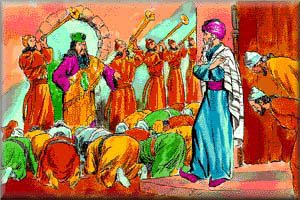
Not content to just punish Mordecai, Haman (boo ) wanted to
destroy all the Jews. Haman (boo
) wanted to
destroy all the Jews. Haman (boo ) went to the king
and slandered the Jews, convincing
the King Ahasuerus to decree that all Jews be executed.
) went to the king
and slandered the Jews, convincing
the King Ahasuerus to decree that all Jews be executed.
Haman (boo ) cast lots or PURIM* to determine the day of
annihilation.
) cast lots or PURIM* to determine the day of
annihilation.
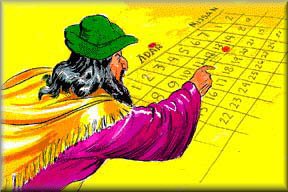
That day was the 13th of Adar (11 months from the
casting of lots), the day the Jews celebrate Purim.
*PUR-PURIM: The origin of the word 'Pur' would seem to
be Persian. As written in the Book of Esther, it means a 'lot'. Purim is the
plural form of the word 'Pur', and thus means 'lots'. The festival is called
Purim because of the lots cast by Haman.
Two or three weeks later, Haman (boo ) called in the king's
secretaries and dictated letters to the governors and officials throughout the
empire, to each province in its own languages and dialects. Those letters were
signed in the name of King Ahasuerus and sealed with his ring.
) called in the king's
secretaries and dictated letters to the governors and officials throughout the
empire, to each province in its own languages and dialects. Those letters were
signed in the name of King Ahasuerus and sealed with his ring.
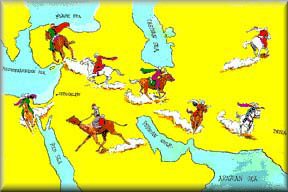
They were then sent by messengers into all the provinces
of the empire, decreeing that the Jews...young and old, women and
children...must all be killed on the date of the following year and their
property given to those who killed them.
Upon learning of the plot, Mordecai tore his clothes,
wore sackcloth and ashes, and walked through the city crying loudly.
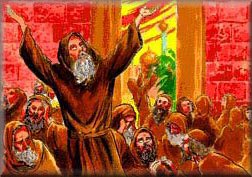
When Esther heard of Mordecai's display, she dispatched
a messenger to discover what was troubling her relative. Mordecai told
Esther of the evil decree and instructed Esther to intercede on the Jews'
behalf. Esther agreed to appear before the king unannounced even though anyone
who came to the king uninvited risked losing their life. In
preparation, she and her people fasted and prayed for three days requesting Divine
assistance.
(An excellent plan if you are approaching God with something really important.)
(An excellent plan if you are approaching God with something really important.)
After completing the three-day fast, Esther entered the
king's inner court dressed in her most royal garb. King Ahasuerus welcomed
her, holding out the golden scepter.
(Normally nobody approached the king without being invited.
If you went in without an invitation the king had the option of holding out his scepter to invite you forward or he didn't hold it out. If he didn't hold it out that meant he didn't want to see you. Then you would be put to death.)
(Normally nobody approached the king without being invited.
If you went in without an invitation the king had the option of holding out his scepter to invite you forward or he didn't hold it out. If he didn't hold it out that meant he didn't want to see you. Then you would be put to death.)
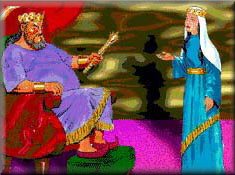
King Ahasuerus granted her an audience promising her
that virtually anything she would ask would be granted.
(He loved her! True love overrides
everything!)
Esther replied that she wished to invite the king and Haman (boo ) to a banquet on that day. After the
feast Esther asked the king and Haman (boo
) to a banquet on that day. After the
feast Esther asked the king and Haman (boo ) to return for another banquet the
following night. Haman (boo
) to return for another banquet the
following night. Haman (boo ) left the banquet consumed with self-importance and
pride, but those feelings were turned to anger when he saw Mordecai sitting at
the gate of the King's palace and paying Haman (boo
) left the banquet consumed with self-importance and
pride, but those feelings were turned to anger when he saw Mordecai sitting at
the gate of the King's palace and paying Haman (boo ) no mind. Haman (boo
) no mind. Haman (boo ) went home,
angered by Mordecai. Haman's wife, Zeresh, advised him to construct a gallows
and to ask the king to hang Mordecai. Haman (boo
) went home,
angered by Mordecai. Haman's wife, Zeresh, advised him to construct a gallows
and to ask the king to hang Mordecai. Haman (boo ) joyously acted upon that
suggestion.
) joyously acted upon that
suggestion.
Esther replied that she wished to invite the king and Haman (boo
That night, King Ahasuerus had trouble sleeping . To
pass the time, he asked that his 'book of chronicles' be read out loud. The
chapter read to him was about the time Mordecai revealed an assassination plot
against him. He was told that Mordecai was never rewarded.
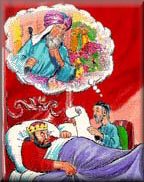
Haman (boo ), who
'just happened to be in the palace',
), who
'just happened to be in the palace',
overheard the king wondering how
to honor a good man. Haman (boo ),
assuming the king wanted to honor
him, advised the king that the
lucky one should be adorned in the king's robes and crown, and paraded through
the streets on the king's horse, and proclaimed as the king's honored subject.
),
assuming the king wanted to honor
him, advised the king that the
lucky one should be adorned in the king's robes and crown, and paraded through
the streets on the king's horse, and proclaimed as the king's honored subject.
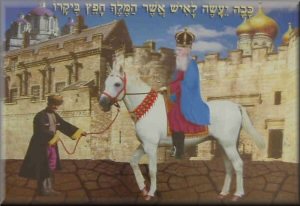
The king liked Haman's (boo ) suggestion so much, he informed
him that he was to be the one to lead Mordecai through the streets of the
capital city Shushan on the king's horse, dressed in the king's robes. Haman (boo
) suggestion so much, he informed
him that he was to be the one to lead Mordecai through the streets of the
capital city Shushan on the king's horse, dressed in the king's robes. Haman (boo ),
was stunned, but had no choice but to fulfill the king's orders, hating
Mordecai all the more.
),
was stunned, but had no choice but to fulfill the king's orders, hating
Mordecai all the more.
After this humiliation, Haman (boo ) attended Esther's second
banquet. It was there that Esther revealed that she was Jewish and exposed Haman (boo
) attended Esther's second
banquet. It was there that Esther revealed that she was Jewish and exposed Haman (boo )
as the evil plotter against her people.
)
as the evil plotter against her people.
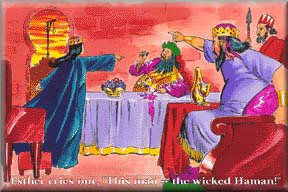
King Ahasuerus was consumed with anger
amd ordered that Haman (boo )
be hanged on the gallows intended for Mordecai.
)
be hanged on the gallows intended for Mordecai.
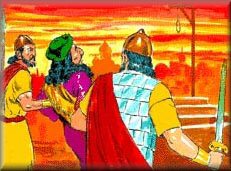
However, the king was unable to rescind Haman's (boo ) decree
against his Jewish subjects since it already bore the king's seal.
) decree
against his Jewish subjects since it already bore the king's seal.
The king elevated Mordecai to be his
new prime minister in place of Haman. According to Persian law, it was
impossible to change a decree stamped with the royal seal, so the king could
not cancel the decree against the Jews. However, he gave Mordechai the
royal signet ring to issue whatever new decrees he could think of to help save
the Jews.
Mordecai sent out a letter saying: On the 13th of Adar, all the Jews in the kingdom would organize to defend themselves. On the 13th of Adar, Jews across the kingdom assembled and defended themselves. Thousands of their enemies were killed, including Haman's ten sons who were hanged from a tree. Unlike the Persians who planned to take money and property, the Jews took no loot at all. On the 14th of Adar, they gave thanks to God and celebrated.
But in the walled capital city of Shushan, the Jews continued to fight an additional day. On the 15th of Adar the Jews of Shushan celebrated their victory.
Mordecai sent out a letter saying: On the 13th of Adar, all the Jews in the kingdom would organize to defend themselves. On the 13th of Adar, Jews across the kingdom assembled and defended themselves. Thousands of their enemies were killed, including Haman's ten sons who were hanged from a tree. Unlike the Persians who planned to take money and property, the Jews took no loot at all. On the 14th of Adar, they gave thanks to God and celebrated.
But in the walled capital city of Shushan, the Jews continued to fight an additional day. On the 15th of Adar the Jews of Shushan celebrated their victory.
Esther asked the rabbis to write the story of Purim. Scrolls - megillot – were written and sent to the Jews throughout the kingdom.
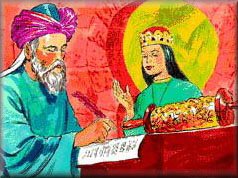
In the Book of Esther we are
introduced to a villainous character named Haman the Agagite. "Agagite" is a
name which contains the clues of an ancient mystery. When Israel came out of
Egypt they were attacked by the Amalekites. It was then said that, "the Lord
will war against Amalek from generation to generation." Amalek had a
descendant named King Agag. The Lord told Saul to kill him, but Saul refused.
As a result, centuries later there arose an evil man named Haman, who, if not
for the hand of God, would have wiped out all the Jewish people living in the
Persian empire. Haman was a descendant of Amalek.
We learn two things here. First, God's Word is always deeper than you think. Second, find out what God's will is. He can see into the future and you can't. If you decide your way is better you may be making a HUGE mistake!
We learn two things here. First, God's Word is always deeper than you think. Second, find out what God's will is. He can see into the future and you can't. If you decide your way is better you may be making a HUGE mistake!
Today's celebrations include:
The Fast of Esther on the 13th of Adar
Purim Day on the 14th of Adar
Shushan Purim on the 15th of Adar
The Fast of Esther on the 13th of Adar
Purim Day on the 14th of Adar
Shushan Purim on the 15th of Adar
which is the main cellebration
in the walled city of Jerusalem
In the Book of Esther, we clearly see God at work in the
lives of individuals and in the affairs of a nation. Even when it looks as if
the world is in the hands of evil men, God is still in control.
He sets them up and He can take them down.
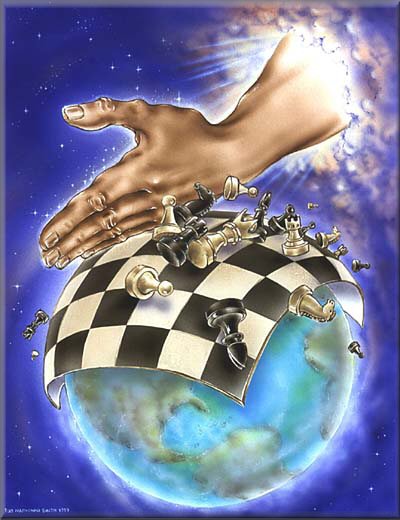
Although we may not understand everything happening
around us, we must trust in God's protection and retain our integrity by doing
what we know is right. Esther, who risked her life appearing before the king,
became a heroine. Mordecai, who was on 'death row' (so to speak), rose
to become the Prime Minister of the nation.
No matter how hopeless our condition, or how much we would like to give up, we need not despair. God is in control of our world!
No matter how hopeless our condition, or how much we would like to give up, we need not despair. God is in control of our world!
Reference:
**Jewish Virtual Library
http://www.jewishvirtuallibrary.org/jsource/Holocaust/Streicher.html
****
Purim: Origins by Amy Kramer
****
Life Application Bible

Shalom and blessings
bj
![]()
|
|

